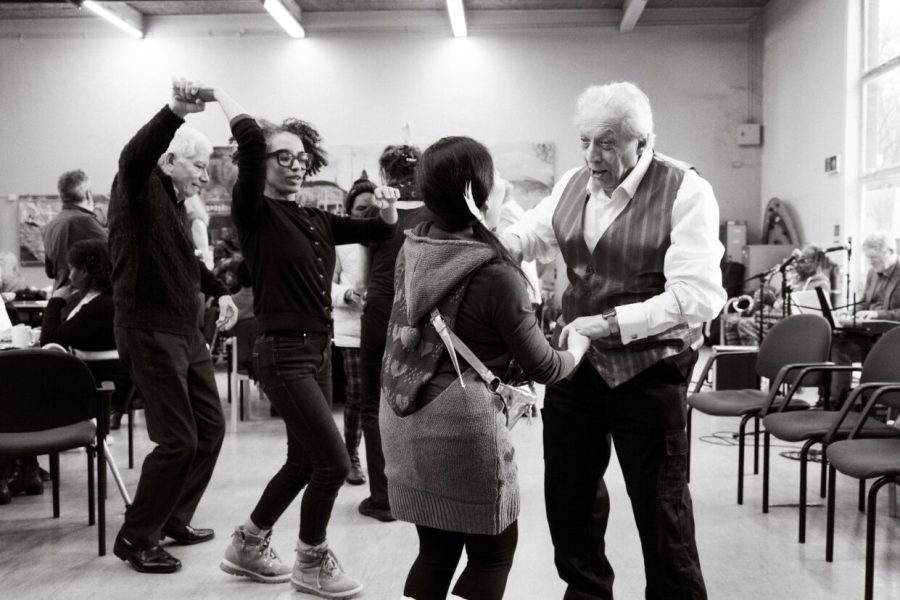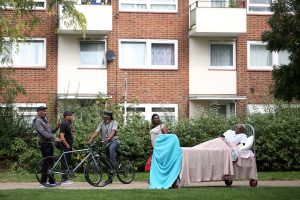“Beyond Words”: Mike Brooks reflects on becoming Entelechy Arts’ permanent Director, and on imagination, the unknowable and fighting fascism
by Mike Brooks
Question: Tell us why you want the job?
Answer: I want to help in the fight against fascism and I want some of your negative capability.
Last month I was made permanent Director of Entelechy Arts, having worked as an interim throughout 2023. Prior to the interview for the role, there were two things that kept appearing at the forefront of my mind, neither making much sense, and both blocking out the more professional points I had rehearsed.
Answer 1: I want to help in the fight against fascism.
One of my longstanding heroes is the musician Julia Holter. In an interview doing promo for her Aviary album (a creative process that began in 2016 with the election of Donald Trump), Holter described her motivations:
“… one of the things I’ve thought about a lot recently is how fascism is a destruction of the imagination” (my italics).1
I was working at the Arts Council when I first read this, a tiny cog in an old institution set up in the aftermath of the Second World War. I suddenly realised that as a public servant administering public arts funding, I was actually fighting on the frontline against fascism. It didn’t feel like Homage to Catalonia, but I hope you get my point. Holter continues:
“… if we can keep music creative and independent, I do honestly feel like it can help ward away fascism and/or indicates some elements of a healthy society.”2
Holter’s description helped me see a deeper value in my work. Crucially I realised that our society isn’t creative because we warded off fascism. In fact, we keep warding off fascism because we stay creative.
Is this what we do at Entelechy Arts, provide a preventative medicine that fires up imaginations through creativity, warding off all our worst impulses? Well, maybe. Having worked in the field of ‘co-creation’ for a long time, this interpretation actually makes me uncomfortable. There’s an ever-present worry that ‘co-creation’ is nothing more than a status quo/neo-liberal/big society sticking plaster.3 Another artist I like a lot, Rhiannon Armstrong, refers to co-creation as a:
“Language used by the powerful to give themselves permission to look away from extractive power structures, and leave unaddressed the status quo of who gatekeeps, and who has access to financial resource and platforms in the name of culture.”4
Not so much warding off fascism as warding off critique.
At Entelechy Arts it feels very different. Our work embraces conflict, tension and often irreconcilable differences. Inspired by a former trustee, we try to “share autonomy” and lean into the tension.5 While all our activity allows space for joy — and at times is side-splittingly funny — that’s clearly not the purpose of the work, which can take us into dark spaces that sometimes don’t appear to have an exit. There is a constant process of identifying where the power lies and then transferring it back to our community, something that has happened since the early days of Entelechy Arts, and that was more recently formalised by my predecessor Maddy Mills.6
I think this is more what Julia Holter meant, that if our society gives people the means to imagine new and different ways of thinking and being, rather than the odd moment of entertainment or fun, then our fears become a source of positive energy, and the unknown becomes a place we wish to inhabit and explore. Long-serving Entelechy member Gwen puts it more succinctly:
“Sometimes you’ve got to take risks for the unknown”, Gwen Sewell
Answer 2: I want some of your negative capability.
This brings me onto my second thought. In a recent meeting with friends at Heart n Soul and Project Artworks, participants were referred to as “teachers”, I think on the basis that their sensory field was not something a ‘non-disabled’ artist could ever really understand but could at least be inspired by and learn from (there’s probably an ableist projection from me here, if well-intentioned). There is a negative capability7 to what we do, a concept I’ve always felt an affinity for. Literature scholars will know better (the term was coined by Keats),8 but I’ve always understood the concept as a feeling of being comfortable with the limits of our knowledge, with the understanding that some things we can never truly understand (see Franҫois Matarasso’s articulation,9 someone who knows our work well).10 We allow for the not-knowing/can’t-know/stop-knowing, that is genuine co-creation.
The work Entelechy Arts does sits in this indescribable, un-verbalisable space. In a meeting with peers recently we talked about the non-verbal as the majority form of data, something so universal yet drowned out by the dominant verbal, “it’s like grief” said our friends at Lewisham Speaking Up, “beyond words”. We know there is something there – a warmth, a fear, a new thought or connection, a rupture in our assumed way of living – but we can’t articulate what it is. Most crucially we are at peace with the likelihood that we will never be able to. That’s not to say we won’t continue to measure and better understand and evaluate the impact (and ‘value’) of what we do – which I strongly believe makes for longer, better lives – but that to create meaningful work we must “undo doing” (copyright our Creative Director Rebecca Swift), break down our assumptions, throw them on the floor and look at them from new angles.
Our society can be brutal sometimes, and we are going through a particularly brutal time right now when the material conditions that so many of our community (of members and artists) used to enjoy either no longer exist or are unaffordable. It’s crucial we embrace the not-knowing, let go of our assumptions and help one another to make things, do things, face fears and frustrations, fire up our imaginations and fight.
So that’s kind of why I wanted the job, though not entirely something I can put into words.
Mike
- https://www.hungertv.com/editorial/julia-holter-on-creating-meaningful-music-in-a-tumultuous-world/
- https://www.hungertv.com/editorial/julia-holter-on-creating-meaningful-music-in-a-tumultuous-world/
- See https://arestlessart.com/a-selfless-art/what-is-co-creation/a-contested-idea/ for a starting point
- Compass Live Art, Making With: Conversations about Co-Creation, https://compassliveart.org.uk/making-with-researching-with/making-with/
- Dr Sylvan Baker, https://www.culturalvalue.org.uk/podcast/s2-ep-2-who-holds-the-power/
- https://www.artsprofessional.co.uk/magazine/349/feature/cultural-participation-cultural-ownership
- https://en.wikipedia.org/wiki/Negative_capability
- https://www.poetryfoundation.org/articles/69384/selections-from-keatss-letters#:~:text=I%20had%20not%20a%20dispute,is%20capable%20of%20being%20in
- https://arestlessart.com/2024/01/12/living-in-negative-capability/
- https://arestlessart.com/co-creation/a-restless-art/case-studies/bed-entelechy-arts/



